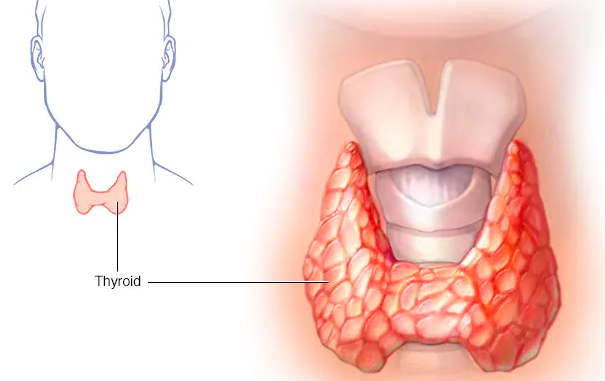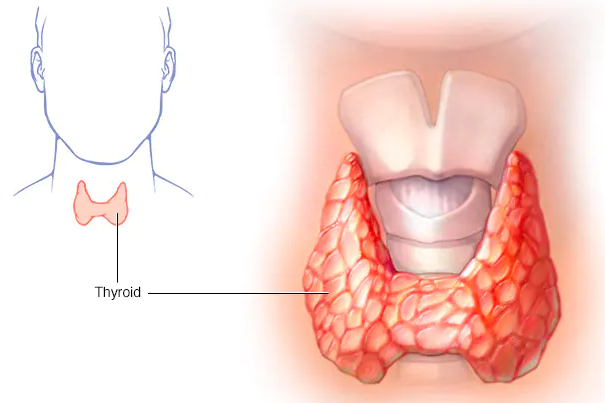
It’s no secret that regular exercise and a well-balanced diet can alleviate the symptoms of a thyroid issue and enhance your general well-being. When it comes to natural vitamins and exercise, there are concerns if you have an undetected thyroid disease that isn’t effectively controlled.
If you’re experiencing symptoms such as exhaustion, insomnia, or weight gain or loss, you should see your doctor. Thyroid problems are one possibility among many for the occurrence of these common symptoms.

Many people suffer from an overactive thyroid. Many people have no idea. As the name suggests, women are more likely than men to suffer from hyperthyroidism. When a person has an overactive thyroid, the body’s metabolism goes into overdrive.
Also See: 8 Health Issues Women Ignore Often
Table of Contents
Suggestive symptoms of Overactive Hypothyroidism can include everything from gastrointestinal disorders to heart illness or mental health issues.
To get a sense of what to look for, here are some examples:
Heat sensitivity. As a result of a faster metabolism, the body temperature rises.
Exhaustion. The wear and tear on a body always in overdrive is greater.
Changes in one’s emotional state. When the central nervous system is overworked and fatigued, it can lead to a wide range of emotional disturbances. In addition to insomnia or irritability, anxiety and depression are often found together.
It is a combination of perspiration and a desire for fluids. Sweating makes your sweat glands work too hard, so you need to drink more water as your body temperature rises.
Insatiable desire for food. The more energy your body expends, the more it begs for more. It’s not uncommon for folks to eat until they’re stuffed.
Loss of weight without cause. It is possible to lose weight even if you eat too much, usually between 5 and 10 pounds. This can go up to 20 pounds in extreme cases.
Heart pounding. Suddenly, you may feel your heart pounding. When you’re working hard or relaxing, this can happen. It’s possible that you’ll notice that your heart rate is substantially higher than usual.
Thyroid gland that has grown in size. The thyroid gland may get enormous and protrude from the neck to form a goiter, but this is not always the case. Having a large goiter can cause it to feel bumpy.
Hand shakes. Your hands may shake if your nerves are overstimulated. If you’re shaking so much that you can’t carry a drink without spilling it, you may be having a seizure.
Diarrhea. An overactive thyroid causes the digestive system to speed up, which leads to more frequent, loose bowel movements.
Problems with the eyes. Eye problems can be serious and develop in some people with an overactive thyroid gland. One of the most common eye symptoms is a retraction of the eyelids, which makes it look as if the eyes are bulging or staring intensely. You may also notice that your eyes are swollen and runny, and that you have double vision.
Hives. If you have any of these symptoms, antihistamines can ease an itchy rash.
Infertility and menstrual changes. Women may experience irregular or non-existent menstrual cycles, as well as difficulties getting pregnant.
If you have any of these signs or symptoms, make an appointment with your doctor and get your thyroid checked. If an overactive thyroid is left untreated, it can lead to other health issues, such as osteoporosis and heart disease.

(Hyperthyroidism) Overactive thyroid vs. (Hypothyroidism) Underactive thyroid
Exercise can potentially overheat your body if you have considerable hyperthyroidism, which is usually caused by the autoimmune condition Graves’ disease. Hyperthyroidism can cause flushing, anxiety, and insomnia in people.
A person who has a severe case of clinical hyperthyroidism “runs on a treadmill every day, even in their sleep,” doctors say. Overexertion might result in heart failure if thyroid hormones are not properly managed.
The autoimmune disease People with significant hypothyroidism should also be cautious of Hashimoto’s. An abrupt return to activity might be jarring for someone with an underactive thyroid since the heart rate slows down. People may become hypersensitive to the cold and unhappy as a result.
Exercise is discouraged for hypothyroidism patients until their medication regimen has stabilized their condition.
Returning to regular exercise once a person with a thyroid condition has stabilized their thyroid function with medication is safe and can help alleviate any residual symptoms.
As an example, hypothyroidism patients frequently report lethargy and weight gain that is not alleviated by thyroid medication. Exercise is a good way to enhance your energy and keep your weight under control.
Thyroid hormone levels were shown to be significantly lower following one hour of yoga practice per day, reducing symptoms such as fatigue, constipation, and weight loss. Yoga, which is a type of exercise, can help with some of the symptoms of hypothyroidism, but it won’t make it go away.
See Also: Few Ayurvedic and Non-Surgical Kidney Stone Removal Methods
If you suffer from hyperthyroidism or hypothyroidism, finding the ideal workout regimen for you is essential. At the very least, individuals should aim for 150–300 moderate activity sessions each week, or 75–150 intensive exercise sessions per week. Cardiovascular disease death rates can be cut down by exercising on a regular basis, as can anxiety and depression.

Avoid thyroid-friendly diets at all costs
In addition to being aware of the hazards associated with physical activity, thyroid-friendly foods should be avoided at all costs. It’s not true that foods and supplements like iodine and soy can help with symptoms of thyroid diseases. They’re full of false claims.
Iodine deficiency is a prominent cause of hypothyroidism in the world, but the typical American diet is rich in the mineral. To maintain a healthy thyroid, Americans should refrain from taking iodine supplements or eating high-iodine foods like kelp or seaweed on a daily basis.
Anyone can benefit from adding soy to their diet, but hypothyroidism patients should be aware that soy may interfere with the absorption of thyroid hormone. A person with Hashimoto’s disease may develop hypothyroidism if they eat a lot of it on a daily basis.
Patients with Hashimoto’s disease are advised to take 200 micrograms a day of selenium, a trace element that has been linked to a reduction in thyroid inflammation. The natural way to achieve this is to consume a few Brazil nuts, fish, fowl, or other animal proteins.
Your doctor should be aware of any symptoms or questions you may have about your thyroid issue.
Read More: Top Plus-Size Brands in Bikini, Tikinies, Swimwear or Swimsuits
